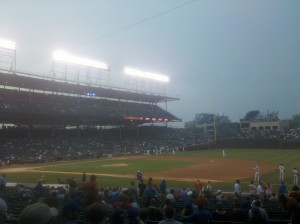Learning Economics at the Ballgame
 Upon hearing about yesterday’s gorgeous weather in Chicago, Darren and I made plans to see the Cubs play last night. I bought the tickets on a ticket reselling website and other than the 30 minute rainstorm, the weather was gorgeous. The game itself turned out to be pretty good too.
Upon hearing about yesterday’s gorgeous weather in Chicago, Darren and I made plans to see the Cubs play last night. I bought the tickets on a ticket reselling website and other than the 30 minute rainstorm, the weather was gorgeous. The game itself turned out to be pretty good too.
Today, just by chance, I got an email from cubs.com thanking me for attending the game, which seemed kind of strange, given that I didn’t buy the tickets from the team. Of course, I’m not that naive …
In the past 5-10 years, many sports leagues and teams have been partnering with ticket resellers to advertise them in the media materials. But there’s also pretty ample proof that they’re also using these services to unload certain tickets. The problem goes as such — tickets have different market values, even if its the same seats. A Cubs-Cardinals game on the Fourth of July is going to be way more valuable than a Cubs-Nationals Thursday afternoon game in April. If the Cubs try to sell each at its market value it does two things:
1) It pisses of the season ticket holders who paid way more for the Cubs-Nationals game. You don’t want to piss of the season ticket holders.
2) It makes the team look bad — they’re implicitly marketing their opponents rather than themselves. (This reminds me of the Washington Bullets season tickets ads ~20 years ago where they advertised the opportunity to see Michael Jordan, Magic Johnson, and Larry Bird play.)
So the deal works one of two ways:
1) The team sells popular tickets to a scalper with the stipulation that they also buy tickets to less popular games. The scalper sells the less popular tickets at a loss, but the popular ones at a huge profit. The scalper looks like the bad guy, but doesn’t really care.
2) The team sells the tickets on a resale site where the purchaser buys without knowing where the tickets came from. The team can charge the true market rate for the tickets, and this allows the team to customize pricing based on other factors. (The team sucks but you still want to get people in the park once September and October roll around).
It’s really not a bad idea, but I was surprised by the email because the Cubs essentially confirmed my suspicions. When we got to our section, the attendant saw our printed tickets and showed us to our seats before we even showed him the row and seat number. The Cubs have definitely gotten in hot water for selling directly to scalpers in the past, but this was when the team was a much more popular draw.
In sum though, I don’t think this is a horrible idea either. If you want to take the family to enjoy a game, it creates a chance to get decent seats for a fairly low price. The people who come to see prime games basically subsidize your cost.
Likewise, it also tells us that face value is now a meaningless number. The next time you’re negotiating with a scalper, remember that even when you buy a $60 face value ticket for $20, he probably also got the chance to buy another ticket for $60, that he resold for $180. You’re not the negotiating genius you thought you were.